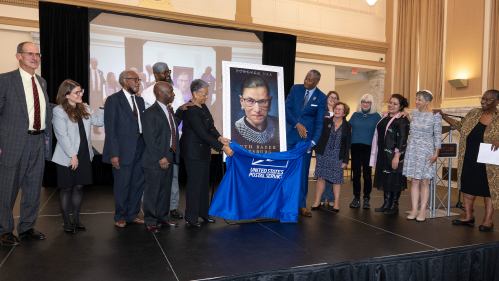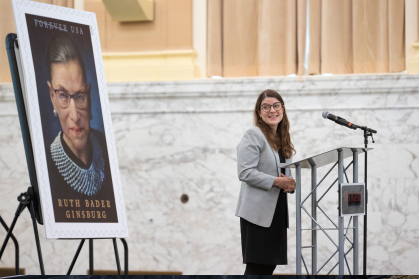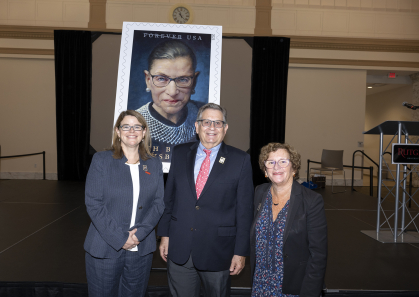Rutgers Receives $6.5 Million to Establish Law Clinic Honoring Ruth Bader Ginsburg

Rutgers Law School dean announces gift at unveiling of the U.S. Postal Service’s Ruth Bader Ginsburg stamp
Rutgers Law School received $6.5 million from the Stephanie and Harold Krieger Charitable Trust, one of the largest gifts in its history, to help establish the Ruth Bader Ginsburg Women’s Rights and Gender Justice Clinic.
Rutgers Law School Dean Johanna Bond announced the gift on Monday at a formal unveiling of the U.S. Postal Service’s Ruth Bader Ginsburg stamp. The celebration took place at Ruth Bader Ginsburg Hall on Rutgers-Newark’s campus.
“This gift will re-establish and expand the former Women’s Rights Litigation Clinic, which the Justice founded here in the early 1970s and which accomplished groundbreaking law reform until it ceased operation in the early 2000s,” Bond said.
The clinic’s mission will be to advance gender equity through direct representation, impact litigation, and legislative work; educate a new generation of students to continue the fight for gender equity; and expand the reach of Rutgers’ nationally ranked clinical programs with a distinct women’s and gender rights clinic.
Part of the gift also creates The Stephanie and Harold Krieger Memorial Endowed Scholarship with a $1 million endowment. This will provide major scholarships for three law students in Newark. Preference will be given to first-generation college students in good academic standing with demonstrated financial need.
Harold Kreiger graduated from New Jersey Law School, the predecessor of Rutgers Law, in 1929. He had an active practice that spanned labor law, workers compensation, criminal law, and municipal law. During his lengthy career of private and public practice in Jersey City, he served as municipal judge, assistant corporation counsel, counsel to the Redevelopment Agency and the Parking Authority, and Hudson County counsel. In later years, he served as commissioner of the Tri-State Regional Planning Commission.
In his will, Kreiger, who died in 1992, stated that upon the passing of his wife, Stephanie, a charitable trust would be created and directed by the named trustee, Brett S. Harwood, a longtime family friend. Before Stephanie’s passing, Harwood received her full endorsement of the new clinic’s funding and scholarship fund.
“The fight goes on. The legacy goes on,” Harwood stated. “We’re creating the funds to create a long-lasting legacy to Ruth Bader Ginsburg, and it pleases me very, very much to be able to facilitate this.”

The celebration to unveil the new stamp in Ginsburg’s honor drew nearly 200 people, including students from Barringer, Central, and University High Schools in Newark. Justice Ginsburg’s granddaughter Clara Spera, a lecturer at Harvard Law School, gave remarks at the celebration.
“This stamp is an especially meaningful tribute to my grandmother for many reasons,” Spera said. “She joins the ranks of other justices she revered, like Thurgood Marshall, and other path-marking civil rights advocates like Ella Baker and women’s rights pioneers like Lucretia Mott and Elizabeth Cady Stanton.”
The event was co-sponsored by the U.S. Postal Service; the Ebony Society of Philatelic Events and Reflections, which commemorates stamps related to the African Diaspora; and the American Association of University Women’s New Jersey Chapter. Rutgers-Newark was also a sponsor.
Ruth Bader Ginsburg Hall, built in 1929, was named in her honor in 2020. The neoclassical skyscraper was home to the law school from 1975 to 1999 and now features a residential facility for students and event space.
“Standing here, in a building named for our beloved Justice Ginsburg, on a campus where she herself found inspiration, I find inspiration, too; to keep fighting for justice with our faculty, our staff, our students who are incredibly inspiring in their own right,” said Rutgers-Newark Chancellor Nancy Cantor.

A revered champion of civil rights, Justice Ginsburg served on the Supreme Court from 1993 until her death in 2020. During her time on the court, she issued many opinions that advanced equal rights for women and credited her time at Rutgers Law as inspiration for her work. She taught at Rutgers Law School in Newark from 1963 to 1972, becoming one of only two women law professors at Rutgers and one of just a handful in the nation.
Ginsburg led a seminar on women and the law and served as the founding faculty adviser for The Women’s Rights Law Reporter (WRLR) The journal is now the oldest legal periodical in the U.S. focusing exclusively on the field of women’s rights law. Elizabeth Langer ‘73, who co-founded WRLR and served as its first editor-in chief, gave a brief history of the journal’s origins at the celebration.
“[Ginsburg] was our teacher, our role model, and our anchor during a time when we needed support,” Langer said. “She gave us strength to pursue a mission: making the world a better place by serving those who have been marginalized.”
Langer mentioned that female enrollment was at 20 percent when she entered Rutgers Law School in 1970, which was unusually high for a U.S. law school. Fifty-three years later, Rutgers Law has the highest enrollment of women in the law school’s history at 59 percent.


